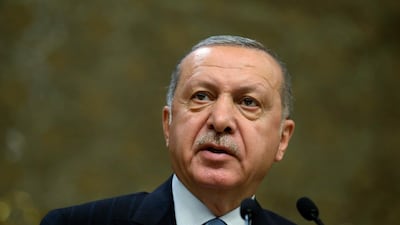Turkey remains adamant that it will purchase the Russian S-400 surface-to-air missile system. Ankara knows that the risks include US sanctions, isolation within Nato and exclusion from the F-35 Joint Strike Fighter programme. It has even rejected a potential compromise solution, whereby it sells its S-400s to a third party.
Is there something about the S-400 system that is vital to Turkish security? Is it that good?
Sure, S-400s are effective against non-stealth aircraft and, possibly, fifth-generation fighters. They are also less expensive than US Patriot batteries, which Washington has offered Turkey. However, they do not form a complete defence system and are more effective when part of an integrated multi-layered structure that would include other Russian hardware, such as medium-range SA-17 missiles. Turkey doesn't have these. Instead, it has British Rapiers and American MIM-23s.
The S-400 is incompatible with Nato hardware and risks security leaks. This means that in order to avoid a complete breakdown with Nato, Ankara would have to deploy S-400s far from bases used by Nato countries, hundreds of miles away from where they would be most effective. Put simply, S-400s do not serve Turkey’s strategic needs.
So why is Ankara insistent that the S-400s are a done deal? Why the disregard for relations with the US? Yes, it is infuriated by Washington’s support for the People’s Protection Units, which Turkey claims are affiliated to the Kurdistan Workers’ Party (PKK), which both countries list as a terrorist organisation. And, yes, Ankara is angered that Fethullah Gulen – who it claims is the mastermind of the July 2016 attempted coup – is a permanent resident of the US. However, these are symptoms rather than the causes of the problem.
There are three underlying reasons for the decline in US-Turkish relations: first, the fact that the main threats to Turkey’s security come from within and are considered more important than external enemies; second, Turkey’s self-perception as a great international power; third, President Recep Tayyip Erdogan’s use of Islam to legitimise Turkey’s regional ambitions.
The PKK and the Gulen movement are what the Turkish government would consider its two greatest existential threats – it may even add that they are part of an international conspiracy against Turkey. The PKK has waged an armed separatist struggle for more than three decades, a conflict that has claimed the lives of tens of thousands of people.
Despite some attempts to find a political solution, this is unlikely to occur any time soon. Instead, peaceful elected members of the left-wing and pro-Kurdish Peoples’ Democratic Party (HDP) faced imprisonment and removal from office. Meanwhile, the Gulen movement remains the Turkish government’s public enemy number one. Since the attempted coup, hundreds of thousands of public officials have been either imprisoned or purged from state institutions, and the resurgence of the movement is one of the government’s biggest fears.
Turkey considers international powers friend or foe based on the extent to which they support its fight against the PKK and the Gulen movement. Russia was quick to back Ankara against the Gulen movement in 2016, and panders to Turkish concerns about the YPG in Syria. Turkey's traditional allies in the West have failed to impress Ankara to the same extent. This is why US support for the YPG has left it seething.
Sometimes observers place Turkey into a specific area of influence: the western alliance, the Russian orbit or the Iranian axis. But from Ankara's perspective, Turkey is a great power in its own right. In international affairs, Turkey finds it difficult to reconcile its self-image of greatness, which often emanates from a selective and politicised memory of its Ottoman past, with its reality as a medium-sized power.
Mr Erdogan is on record calling for the United Nations Security Council to be reformed in order to reflect that “the world is bigger than five”, no doubt implying that he would like Turkey to have a permanent seat at the table. Reportedly, he had even suggested that the UN headquarters should be moved to Istanbul. Reconciling strategic interests with Turkey’s delusions of grandeur is a difficult task for policy makers.
Mr Erdogan sees himself as the leader of the Muslim world. This is clear not from the fact that he stood against US recognition of the occupied Syrian Golan Heights as Israeli territory and of Jerusalem as Israel’s capital, but in the way he chose to do so. In the case of Jerusalem, Turkey blasted the decision and convened a special emergency summit of the Organisation of Islamic Cooperation.
Back in 2016, King Abdullah II of Jordan told US congressional leaders that Mr Erdogan seeks a "radical Islamic solution" to conflicts in the Middle East. In many respects, the Jordanian King was right. Turkey's government continues to support Hamas, side with Egypt's Muslim Brotherhood and sponsor a range of Islamist militants in Syria. Mr Erdogan is also silent about Iranian interference in regional affairs.
In this context, how can Mr Erdogan back down against the US? It would be a setback for Turkey’s regional ambitions and his personal desire to lead the Muslim world. It would also do nothing to counter the country’s internal enemies. No wonder he considers S-400s a done deal.
Dr Simon Waldman is a visiting research fellow at King’s College London. He is the co-author of The New Turkey and Its Discontents

